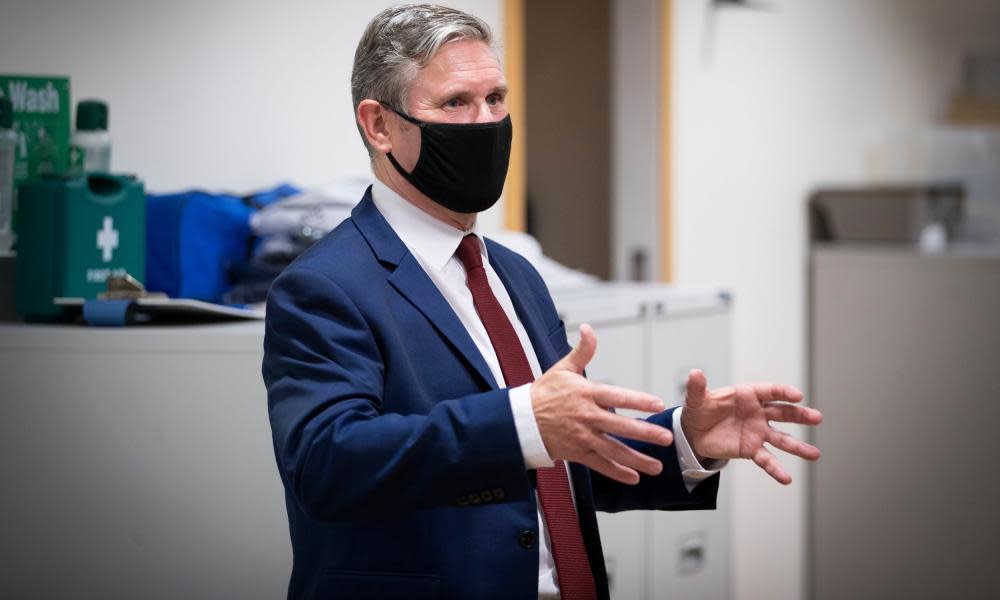Labour conference: five key issues for Keir Starmer's party

No cheering crowds of members, no karaoke, no plotting in the hotel bars and no late night compositing: Keir Starmer’s first party conference as Labour leader, which starts this weekend, will be unlike any other.
Instead of Liverpool’s airy ACC convention centre, it is being held online, with the strapline: A New Leadership.
Labour has certainly made progress in the opinion polls since Starmer won the leadership contest, but many challenges remain. Here are some of them:
What is Starmerism?
Labour’s new leader has praised Britain’s veterans, condemned protesters who pulled down the Colston statue in Bristol and needled the prime minister over his failings in tackling the pandemic.
But Starmer has said less about his vision for Labour and for Britain.
He is expected to use his speech on Tuesday to talk about his personal values and politics. But he will continue to be wary of setting out detailed policies – on tax and spend, for example.
Starmer’s supporters regard this caution as sound politics. But sceptics claim it means he lacks Corbyn’s ideological clarity.
Related: No kicks, coughs or slip-ups as party conferences go online
Brexit
During recent debates Starmer could not have been clearer: Brexit is concluded as an argument, Labour lost and Boris Johnson needs to get on with finalising a deal.
While this does blunt attacks on Starmer as an out-of-touch remainer lawyer, there are difficulties ahead.
Labour objects to the internal market bill not because it lays the legislative framework for Brexit, but because it details how the government could unilaterally rewrite the withdrawal agreement with the EU, thus breaking international law.
But every time Labour votes against the measure, or similar ones, Johnson and his team will loudly proclaim that Starmer is seeking to “frustrate Brexit”.
Government in waiting?
Labour’s strategy is to hammer homethat Johnson and his cabinet are “incompetent”.
But voters – including those in “red wall” seats – need to trust Starmer’s team to do better. Yet many of them, including the shadow chancellor Anneliese Dodds and the shadow home secretary, Nick Thomas-Symonds, remain low-profile.
One aim of this week’s virtual conference is to try to bring them into the spotlight, along with Starmer’s deputy, Angela Rayner.
Party tensions
Tensions between Labour’s left and right were reignited by the sacking of Rebecca Long-Bailey and the leak of an internal report that detailed a “hyper-factional” atmosphere in party HQ.
When Starmer set up a review, chaired by Martin Forde QC, to examine the claims in the explosive report, Jeremy Corbyn was among those who urged it to investigate allegations that staffers had deliberately sought to sabotage the 2017 election by channelling funds to chosen constituencies.
The review is yet to report, but it is likely to spark a new outbreak of hostilities. Many on the left are reserving judgment until they see more policy details emerge from Starmer and his team – he signed up to 10 “pledges” during his leadership campaign, which included the wholesale adoption of much of Corbyn’s leftwing prospectus.
Antisemitism
Starmer won praise from Jewish leaders for his immediate promise on taking over the leadership to get a grip of antisemitism cases within the party, and the issue has since receded in media prominence.
This could change, however, with the imminent publication of a report by the Equality and Human Rights Commission into allegations of institutional antisemitism within Labour.
While Starmer will respond to the findings by emphasising a different approach under his leadership, it is likely to reignite internal party arguments from the Corbyn era. Meanwhile, the Conservatives will undoubtedly try and remind voters that Starmer was a key shadow cabinet member under Corbyn.


